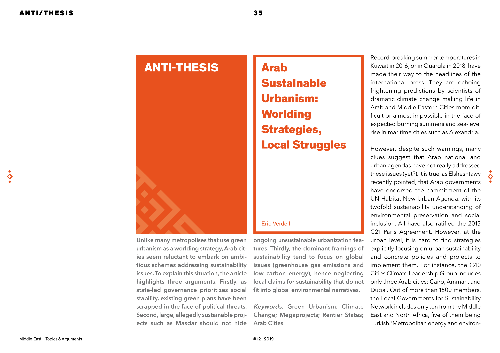Arab Sustainable Urbanism: Worlding Strategies, Local Struggles
Unlike many metropolises that use green urbanism as a worlding strategy, Arab cities seem reluctant to embark on ambitious schemes addressing sustainability issues. To explain this situation, the article highlights three arguments. Firstly, as state-led governance prioritizes social stability, exist...
Furkejuvvon:
| Publikašuvnnas: | Middle East - Topics & Arguments |
|---|---|
| Váldodahkki: | |
| Materiálatiipa: | Artikel (Zeitschrift) |
| Giella: | eaŋgalasgiella |
| Almmustuhtton: |
Philipps-Universität Marburg
2019
|
| Fáttát: | |
| Liŋkkat: | Liŋkkat |
| Fáddágilkorat: |
Lasit fáddágilkoriid
Eai fáddágilkorat, Lasit vuosttaš fáddágilkora!
|
| Čoahkkáigeassu: | Unlike many metropolises that use green urbanism as a worlding strategy, Arab cities seem reluctant to embark on ambitious schemes addressing sustainability issues. To explain this situation, the article highlights three arguments. Firstly, as state-led governance prioritizes social stability, existing green plans have been scrapped in the face of political threats. Second, large, allegedly sustainable projects such as Masdar should not hide ongoing unsustainable urbanization features. Thirdly, the dominant framings of sustainability tend to focus on global issues (greenhouse gas emissions and low carbon energy), hence neglecting local claims for sustainability that do not fit into global environmental narratives. |
|---|---|
| DOI: | 10.17192/meta.2019.12.7935 |
 Publikationsserver
Publikationsserver